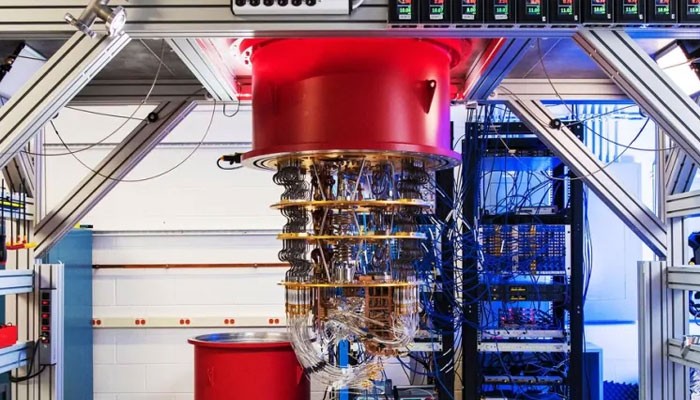
عام کمپیوٹر کو کوانٹم کمپیوٹر سے زیادہ تیز رفتار بنانے والا الگورتھم تیار
کوانٹم کمپیوٹرز کے بارے میں دعویٰ کیا جاتا ہے کہ وہ بہت تیزی سے ٹاسک مکمل کرتے ہیں اور عام کمپیوٹر ان کا مقابلہ نہیں کرسکتے۔
If the quantum computing era dawned 3 years ago, its rising sun may have ducked behind a cloud. In 2019, Google researchers claimed they had passed a milestone known as quantum supremacy when their quantum computer Sycamore performed in 200 seconds an abstruse calculation they said would tie up a supercomputer for 10,000 years. Now, scientists in China have done the computation in a few hours with ordinary processors. A supercomputer, they say, could beat Sycamore outright.

درحقیقت گوگل نے تو 2019 میں دعویٰ کیا تھا کہ اس نے ایک ایسا جدید ترین کوانٹم کمپیوٹر تیار کیا ہے جو مشکل ترین اور پیچیدہ کام سپر کمپیوٹر کے مقابلے میں صرف 3 منٹ میں پورا کرسکتا ہے جبکہ سپر کمپیوٹر کو یہ کام کرنے میں 10 ہزار سال لگ سکتے ہیں۔
مگر اب ایک نئی تحقیق میں کوانٹم کمپیوٹرز کی اس بالادستی کو چیلنج کیا گیا ہے۔
چین کے انسٹیٹوٹ آف Theoretical فزکس کی تحقیق میں ایک ایسا مؤثر الگورتھم تیار کیا گیا جو عام کمپیوٹر کو بھی کوانٹم کمپیوٹر کی طرح ٹاسک مکمل کرنے والا بنا دیتا ہے، بس وہ 3 منٹ کی بجائے یہ کام 15 گھنٹے میں مکمل کرتا ہے۔
تحقیق کے مطابق جس کمپیوٹر پر اس الگورتھم کو استعمال کیا گیا وہ کچھ زیادہ طاقتور نہیں تھا۔
Zhang and colleagues also relied on a key insight: Sycamore’s computation was far from exact, so theirs didn’t need to be either. Sycamore calculated the distribution of outputs with an estimated fidelity of 0.2%—just enough to distinguish the fingerprint-like spikiness from the noise in the circuitry. So Zhang’s team traded accuracy for speed by cutting some lines in its network and eliminating the corresponding gates. Losing just eight lines made the computation 256 times faster while maintaining fidelity of 0.37%.

The researchers calculated the output pattern for 1 million of the 9 quadrillion possible number strings, relying on the innovation of their own to obtain a truly random, representative set. The computation took 15 hours on 512 GPUs and yielded the telltale spiky output. “It’s fair to say that the Google experiment has been simulated on a conventional computer,” says Dominik Hangleiter, a quantum computer scientist at the University of Maryland, College Park. On a supercomputer, the computation would take a few dozen seconds, Zhang says—10 billion times faster than the Google team estimated.

محققین نے کہا کہ اگر اس الگورتھم کو کسی جدید سپر کمپیوٹر میں استعمال کیا جائے تو ہمارا اندازہ ہے کہ ٹاسک مکمل کرنے کے لیے چند درجن سیکنڈ درکار ہوں گے اور وہ گوگل کے کوانٹم کمپیوٹر سے بھی زیادہ تیز ہوجائے گا۔
یہاں یہ بات یاد رکھنی چاہیے کہ کوانٹم پراسیسرز ابھی تک مکمل کمپیوٹر نہیں اور ان کی ٹاسک مکمل کرنے کی صلاحیت محدود ہوتی ہے۔
اس وقت ان کو تیار کرنے والے اداروں کا مقصد کسی مخصوص ٹاسک میں مشین کی بالادستی قائم کرنا ہوتا ہے۔
اس تحقیق کے نتائج فزیکل ریویوز لیٹرز میں شائع ہوئے اور اس الگورتھم کو Sycamore پراسیسر کا نام دیا گیا ہے۔
The advance underscores the pitfalls of racing a quantum computer against a conventional one, researchers say. “There’s an urgent need for better quantum supremacy experiments,” Aaronson says. Zhang suggests a more practical approach: “We should find some real-world applications to demonstrate the quantum advantage.” The Power of GPT-4
Still, the Google demonstration was not just hype, researchers say. Sycamore required far fewer operations and less power than a supercomputer, Zhang notes. And if Sycamore had slightly higher fidelity, he says, his team’s simulation couldn’t have kept up. As Hangleiter puts it, “The Google experiment did what it was meant to do, start this race.” Adobe After Effects CC 2020 Free Download



